Reflective Essay: Applying Person-Centred Care in Nursing Practice
VerifiedAdded on 2021/10/05
|7
|2346
|137
Essay
AI Summary
This reflective essay details a nursing associate's experience during a placement, focusing on a challenging encounter with a 45-year-old woman experiencing a psychotic episode related to schizophrenia. The essay follows the 'What, So what, Now what' framework, reflecting on the nursing associate's actions, the patient's response, and the subsequent analysis of the situation. The student describes the initial assessment, the patient's lack of engagement, and the supervisor's intervention. The essay analyzes the application of person-centred care principles, specifically highlighting the importance of respecting patient preferences, obtaining consent, and recognizing non-verbal cues. It identifies mistakes made, such as touching the patient without consent and not allowing her to respond. The reflection emphasizes the need to prioritize patient needs, wishes, and rights, as outlined in the Nursing Associate Apprenticeship standards (Domain 2). The essay concludes with insights on improving future practice, including better communication, observation, and a more holistic approach to patient care, focusing on building a therapeutic alliance and respecting individual dignity. The author references multiple sources to support their reflections and learning.
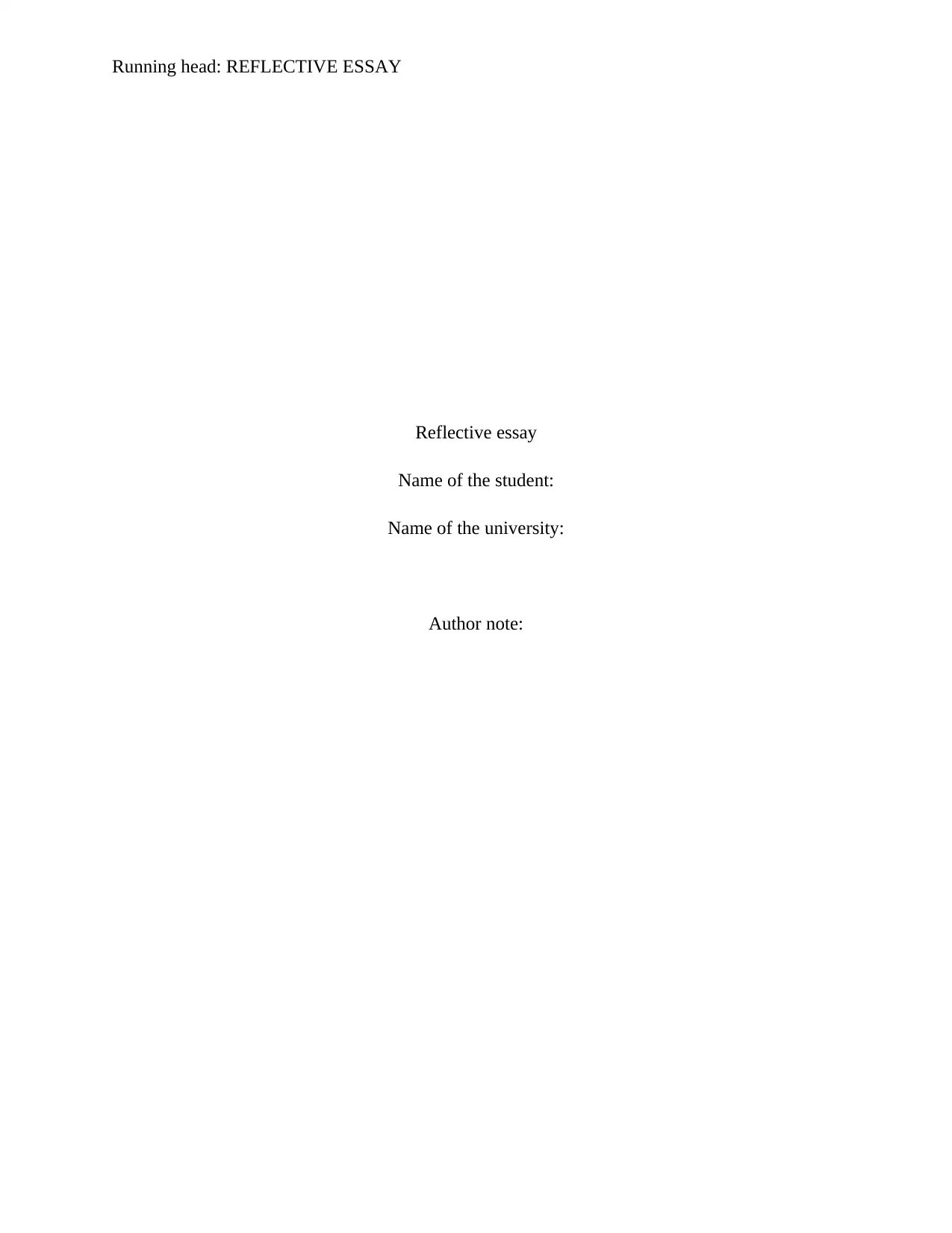
Running head: REFLECTIVE ESSAY
Reflective essay
Name of the student:
Name of the university:
Author note:
Reflective essay
Name of the student:
Name of the university:
Author note:
Paraphrase This Document
Need a fresh take? Get an instant paraphrase of this document with our AI Paraphraser
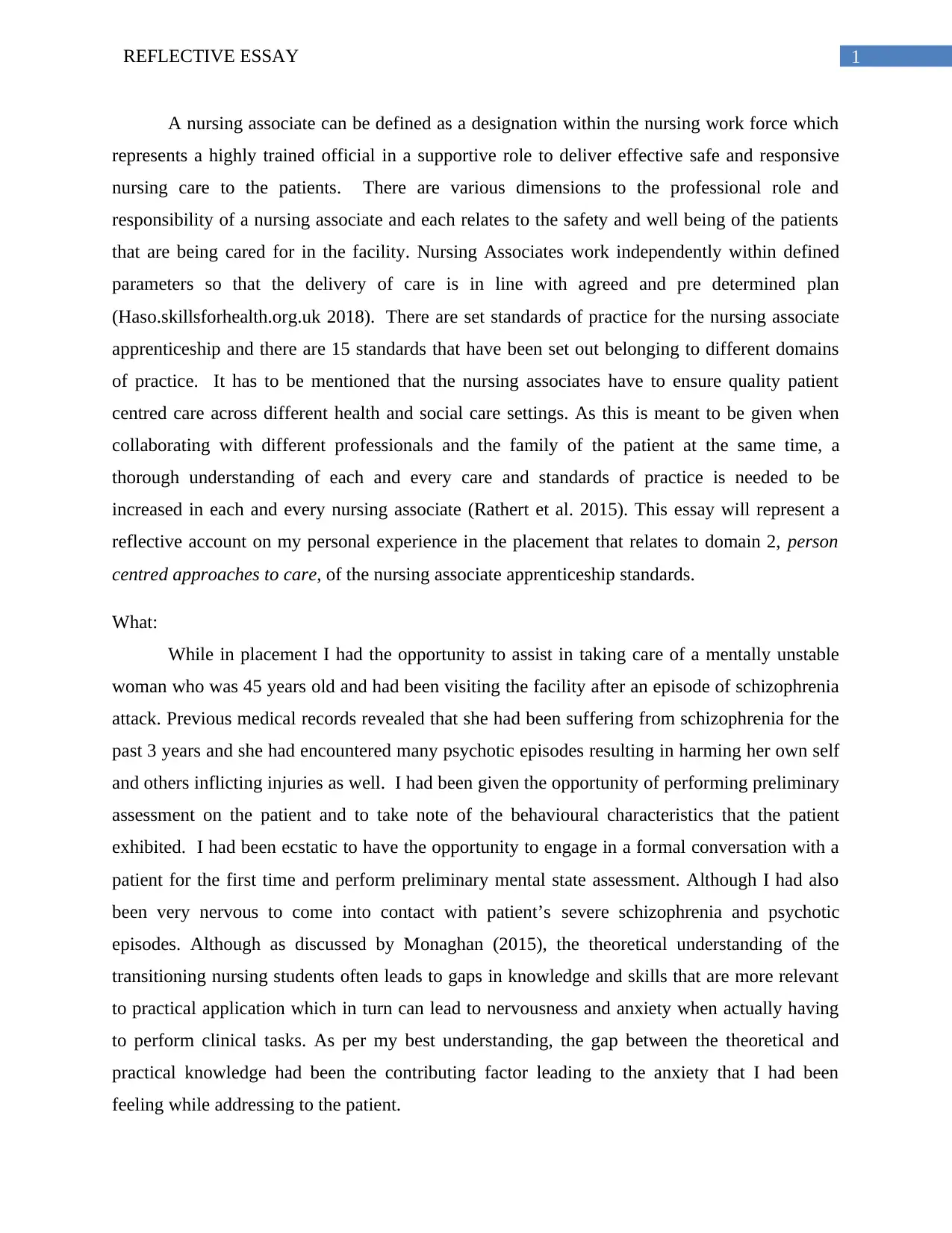
1REFLECTIVE ESSAY
A nursing associate can be defined as a designation within the nursing work force which
represents a highly trained official in a supportive role to deliver effective safe and responsive
nursing care to the patients. There are various dimensions to the professional role and
responsibility of a nursing associate and each relates to the safety and well being of the patients
that are being cared for in the facility. Nursing Associates work independently within defined
parameters so that the delivery of care is in line with agreed and pre determined plan
(Haso.skillsforhealth.org.uk 2018). There are set standards of practice for the nursing associate
apprenticeship and there are 15 standards that have been set out belonging to different domains
of practice. It has to be mentioned that the nursing associates have to ensure quality patient
centred care across different health and social care settings. As this is meant to be given when
collaborating with different professionals and the family of the patient at the same time, a
thorough understanding of each and every care and standards of practice is needed to be
increased in each and every nursing associate (Rathert et al. 2015). This essay will represent a
reflective account on my personal experience in the placement that relates to domain 2, person
centred approaches to care, of the nursing associate apprenticeship standards.
What:
While in placement I had the opportunity to assist in taking care of a mentally unstable
woman who was 45 years old and had been visiting the facility after an episode of schizophrenia
attack. Previous medical records revealed that she had been suffering from schizophrenia for the
past 3 years and she had encountered many psychotic episodes resulting in harming her own self
and others inflicting injuries as well. I had been given the opportunity of performing preliminary
assessment on the patient and to take note of the behavioural characteristics that the patient
exhibited. I had been ecstatic to have the opportunity to engage in a formal conversation with a
patient for the first time and perform preliminary mental state assessment. Although I had also
been very nervous to come into contact with patient’s severe schizophrenia and psychotic
episodes. Although as discussed by Monaghan (2015), the theoretical understanding of the
transitioning nursing students often leads to gaps in knowledge and skills that are more relevant
to practical application which in turn can lead to nervousness and anxiety when actually having
to perform clinical tasks. As per my best understanding, the gap between the theoretical and
practical knowledge had been the contributing factor leading to the anxiety that I had been
feeling while addressing to the patient.
A nursing associate can be defined as a designation within the nursing work force which
represents a highly trained official in a supportive role to deliver effective safe and responsive
nursing care to the patients. There are various dimensions to the professional role and
responsibility of a nursing associate and each relates to the safety and well being of the patients
that are being cared for in the facility. Nursing Associates work independently within defined
parameters so that the delivery of care is in line with agreed and pre determined plan
(Haso.skillsforhealth.org.uk 2018). There are set standards of practice for the nursing associate
apprenticeship and there are 15 standards that have been set out belonging to different domains
of practice. It has to be mentioned that the nursing associates have to ensure quality patient
centred care across different health and social care settings. As this is meant to be given when
collaborating with different professionals and the family of the patient at the same time, a
thorough understanding of each and every care and standards of practice is needed to be
increased in each and every nursing associate (Rathert et al. 2015). This essay will represent a
reflective account on my personal experience in the placement that relates to domain 2, person
centred approaches to care, of the nursing associate apprenticeship standards.
What:
While in placement I had the opportunity to assist in taking care of a mentally unstable
woman who was 45 years old and had been visiting the facility after an episode of schizophrenia
attack. Previous medical records revealed that she had been suffering from schizophrenia for the
past 3 years and she had encountered many psychotic episodes resulting in harming her own self
and others inflicting injuries as well. I had been given the opportunity of performing preliminary
assessment on the patient and to take note of the behavioural characteristics that the patient
exhibited. I had been ecstatic to have the opportunity to engage in a formal conversation with a
patient for the first time and perform preliminary mental state assessment. Although I had also
been very nervous to come into contact with patient’s severe schizophrenia and psychotic
episodes. Although as discussed by Monaghan (2015), the theoretical understanding of the
transitioning nursing students often leads to gaps in knowledge and skills that are more relevant
to practical application which in turn can lead to nervousness and anxiety when actually having
to perform clinical tasks. As per my best understanding, the gap between the theoretical and
practical knowledge had been the contributing factor leading to the anxiety that I had been
feeling while addressing to the patient.
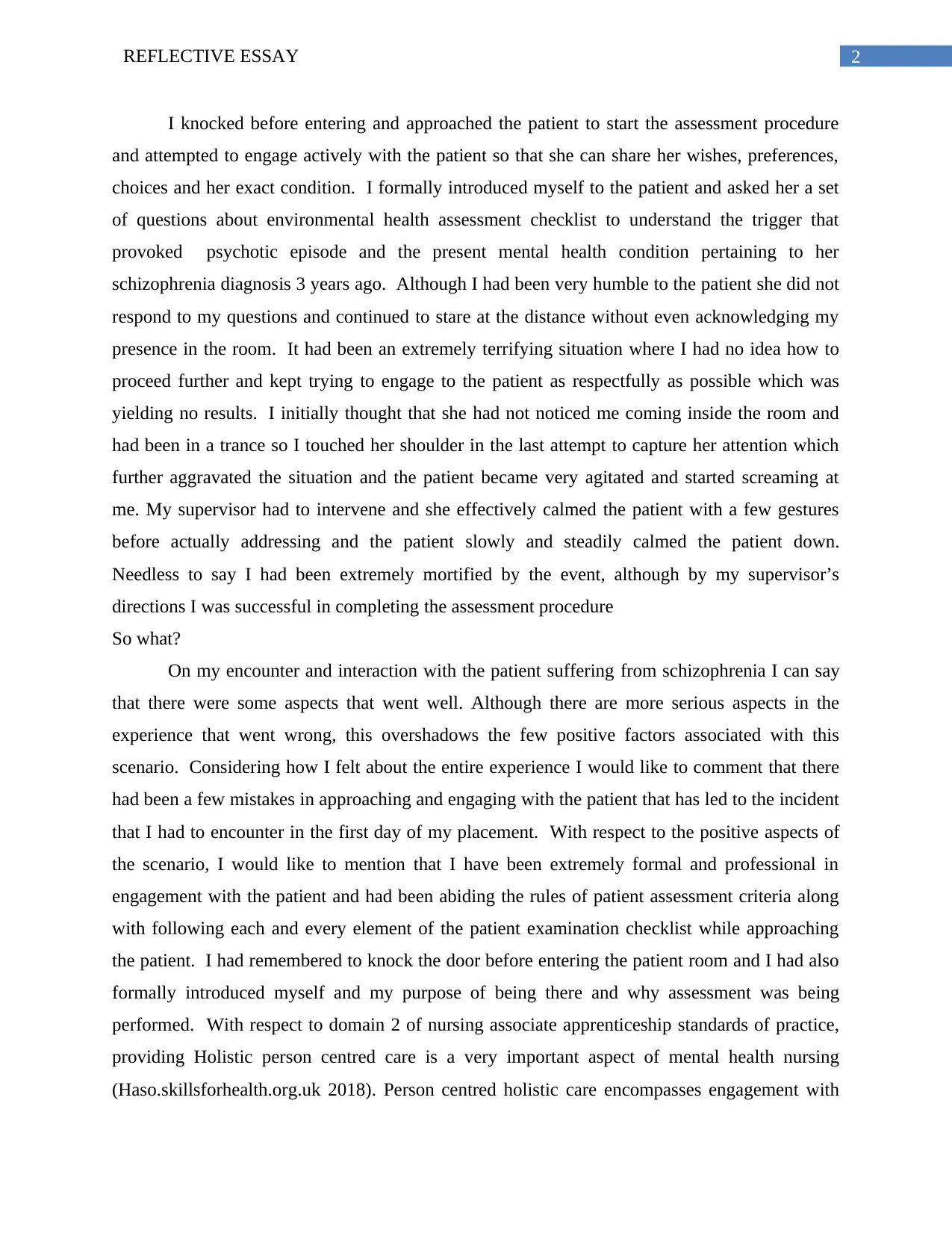
2REFLECTIVE ESSAY
I knocked before entering and approached the patient to start the assessment procedure
and attempted to engage actively with the patient so that she can share her wishes, preferences,
choices and her exact condition. I formally introduced myself to the patient and asked her a set
of questions about environmental health assessment checklist to understand the trigger that
provoked psychotic episode and the present mental health condition pertaining to her
schizophrenia diagnosis 3 years ago. Although I had been very humble to the patient she did not
respond to my questions and continued to stare at the distance without even acknowledging my
presence in the room. It had been an extremely terrifying situation where I had no idea how to
proceed further and kept trying to engage to the patient as respectfully as possible which was
yielding no results. I initially thought that she had not noticed me coming inside the room and
had been in a trance so I touched her shoulder in the last attempt to capture her attention which
further aggravated the situation and the patient became very agitated and started screaming at
me. My supervisor had to intervene and she effectively calmed the patient with a few gestures
before actually addressing and the patient slowly and steadily calmed the patient down.
Needless to say I had been extremely mortified by the event, although by my supervisor’s
directions I was successful in completing the assessment procedure
So what?
On my encounter and interaction with the patient suffering from schizophrenia I can say
that there were some aspects that went well. Although there are more serious aspects in the
experience that went wrong, this overshadows the few positive factors associated with this
scenario. Considering how I felt about the entire experience I would like to comment that there
had been a few mistakes in approaching and engaging with the patient that has led to the incident
that I had to encounter in the first day of my placement. With respect to the positive aspects of
the scenario, I would like to mention that I have been extremely formal and professional in
engagement with the patient and had been abiding the rules of patient assessment criteria along
with following each and every element of the patient examination checklist while approaching
the patient. I had remembered to knock the door before entering the patient room and I had also
formally introduced myself and my purpose of being there and why assessment was being
performed. With respect to domain 2 of nursing associate apprenticeship standards of practice,
providing Holistic person centred care is a very important aspect of mental health nursing
(Haso.skillsforhealth.org.uk 2018). Person centred holistic care encompasses engagement with
I knocked before entering and approached the patient to start the assessment procedure
and attempted to engage actively with the patient so that she can share her wishes, preferences,
choices and her exact condition. I formally introduced myself to the patient and asked her a set
of questions about environmental health assessment checklist to understand the trigger that
provoked psychotic episode and the present mental health condition pertaining to her
schizophrenia diagnosis 3 years ago. Although I had been very humble to the patient she did not
respond to my questions and continued to stare at the distance without even acknowledging my
presence in the room. It had been an extremely terrifying situation where I had no idea how to
proceed further and kept trying to engage to the patient as respectfully as possible which was
yielding no results. I initially thought that she had not noticed me coming inside the room and
had been in a trance so I touched her shoulder in the last attempt to capture her attention which
further aggravated the situation and the patient became very agitated and started screaming at
me. My supervisor had to intervene and she effectively calmed the patient with a few gestures
before actually addressing and the patient slowly and steadily calmed the patient down.
Needless to say I had been extremely mortified by the event, although by my supervisor’s
directions I was successful in completing the assessment procedure
So what?
On my encounter and interaction with the patient suffering from schizophrenia I can say
that there were some aspects that went well. Although there are more serious aspects in the
experience that went wrong, this overshadows the few positive factors associated with this
scenario. Considering how I felt about the entire experience I would like to comment that there
had been a few mistakes in approaching and engaging with the patient that has led to the incident
that I had to encounter in the first day of my placement. With respect to the positive aspects of
the scenario, I would like to mention that I have been extremely formal and professional in
engagement with the patient and had been abiding the rules of patient assessment criteria along
with following each and every element of the patient examination checklist while approaching
the patient. I had remembered to knock the door before entering the patient room and I had also
formally introduced myself and my purpose of being there and why assessment was being
performed. With respect to domain 2 of nursing associate apprenticeship standards of practice,
providing Holistic person centred care is a very important aspect of mental health nursing
(Haso.skillsforhealth.org.uk 2018). Person centred holistic care encompasses engagement with
⊘ This is a preview!⊘
Do you want full access?
Subscribe today to unlock all pages.

Trusted by 1+ million students worldwide
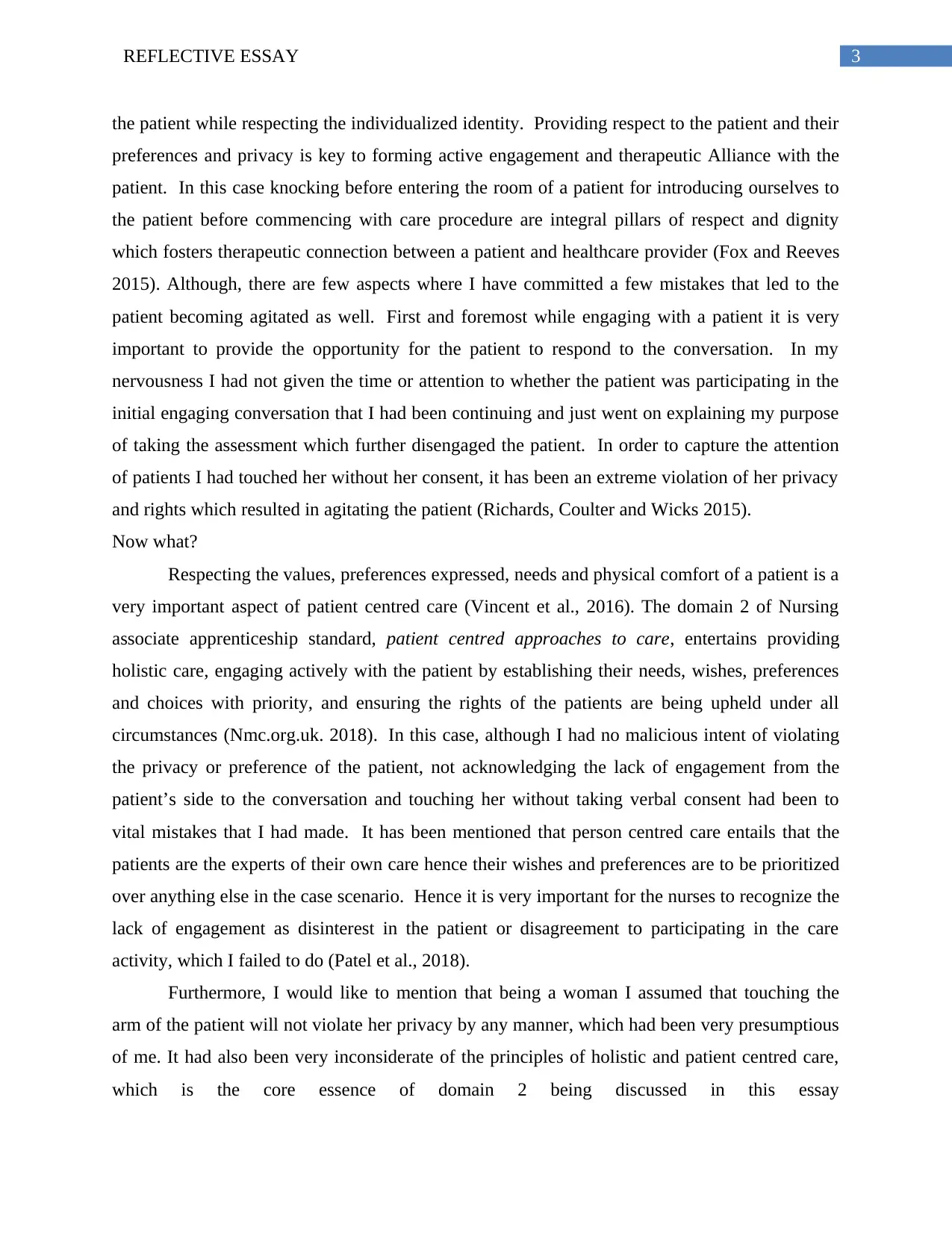
3REFLECTIVE ESSAY
the patient while respecting the individualized identity. Providing respect to the patient and their
preferences and privacy is key to forming active engagement and therapeutic Alliance with the
patient. In this case knocking before entering the room of a patient for introducing ourselves to
the patient before commencing with care procedure are integral pillars of respect and dignity
which fosters therapeutic connection between a patient and healthcare provider (Fox and Reeves
2015). Although, there are few aspects where I have committed a few mistakes that led to the
patient becoming agitated as well. First and foremost while engaging with a patient it is very
important to provide the opportunity for the patient to respond to the conversation. In my
nervousness I had not given the time or attention to whether the patient was participating in the
initial engaging conversation that I had been continuing and just went on explaining my purpose
of taking the assessment which further disengaged the patient. In order to capture the attention
of patients I had touched her without her consent, it has been an extreme violation of her privacy
and rights which resulted in agitating the patient (Richards, Coulter and Wicks 2015).
Now what?
Respecting the values, preferences expressed, needs and physical comfort of a patient is a
very important aspect of patient centred care (Vincent et al., 2016). The domain 2 of Nursing
associate apprenticeship standard, patient centred approaches to care, entertains providing
holistic care, engaging actively with the patient by establishing their needs, wishes, preferences
and choices with priority, and ensuring the rights of the patients are being upheld under all
circumstances (Nmc.org.uk. 2018). In this case, although I had no malicious intent of violating
the privacy or preference of the patient, not acknowledging the lack of engagement from the
patient’s side to the conversation and touching her without taking verbal consent had been to
vital mistakes that I had made. It has been mentioned that person centred care entails that the
patients are the experts of their own care hence their wishes and preferences are to be prioritized
over anything else in the case scenario. Hence it is very important for the nurses to recognize the
lack of engagement as disinterest in the patient or disagreement to participating in the care
activity, which I failed to do (Patel et al., 2018).
Furthermore, I would like to mention that being a woman I assumed that touching the
arm of the patient will not violate her privacy by any manner, which had been very presumptious
of me. It had also been very inconsiderate of the principles of holistic and patient centred care,
which is the core essence of domain 2 being discussed in this essay
the patient while respecting the individualized identity. Providing respect to the patient and their
preferences and privacy is key to forming active engagement and therapeutic Alliance with the
patient. In this case knocking before entering the room of a patient for introducing ourselves to
the patient before commencing with care procedure are integral pillars of respect and dignity
which fosters therapeutic connection between a patient and healthcare provider (Fox and Reeves
2015). Although, there are few aspects where I have committed a few mistakes that led to the
patient becoming agitated as well. First and foremost while engaging with a patient it is very
important to provide the opportunity for the patient to respond to the conversation. In my
nervousness I had not given the time or attention to whether the patient was participating in the
initial engaging conversation that I had been continuing and just went on explaining my purpose
of taking the assessment which further disengaged the patient. In order to capture the attention
of patients I had touched her without her consent, it has been an extreme violation of her privacy
and rights which resulted in agitating the patient (Richards, Coulter and Wicks 2015).
Now what?
Respecting the values, preferences expressed, needs and physical comfort of a patient is a
very important aspect of patient centred care (Vincent et al., 2016). The domain 2 of Nursing
associate apprenticeship standard, patient centred approaches to care, entertains providing
holistic care, engaging actively with the patient by establishing their needs, wishes, preferences
and choices with priority, and ensuring the rights of the patients are being upheld under all
circumstances (Nmc.org.uk. 2018). In this case, although I had no malicious intent of violating
the privacy or preference of the patient, not acknowledging the lack of engagement from the
patient’s side to the conversation and touching her without taking verbal consent had been to
vital mistakes that I had made. It has been mentioned that person centred care entails that the
patients are the experts of their own care hence their wishes and preferences are to be prioritized
over anything else in the case scenario. Hence it is very important for the nurses to recognize the
lack of engagement as disinterest in the patient or disagreement to participating in the care
activity, which I failed to do (Patel et al., 2018).
Furthermore, I would like to mention that being a woman I assumed that touching the
arm of the patient will not violate her privacy by any manner, which had been very presumptious
of me. It had also been very inconsiderate of the principles of holistic and patient centred care,
which is the core essence of domain 2 being discussed in this essay
Paraphrase This Document
Need a fresh take? Get an instant paraphrase of this document with our AI Paraphraser
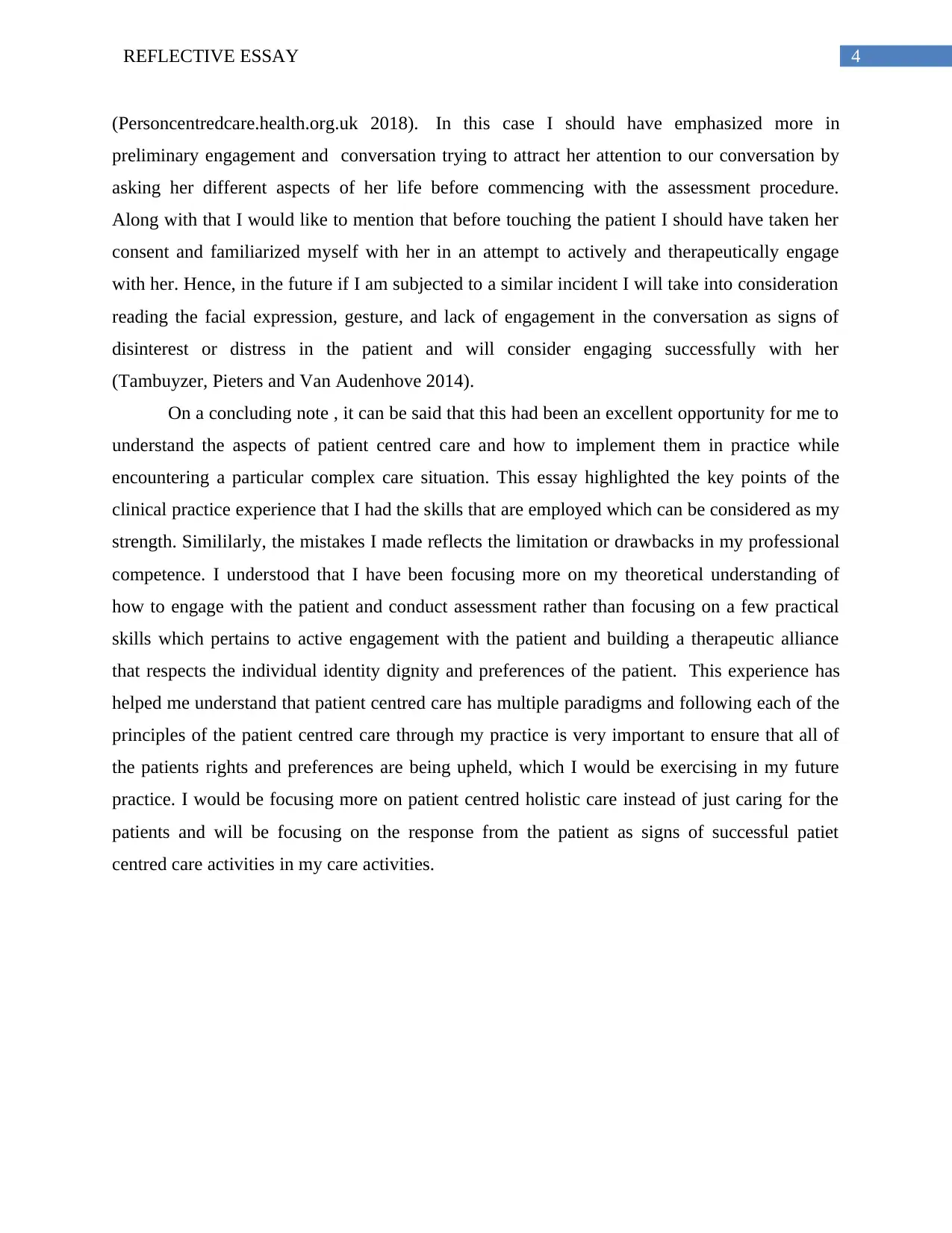
4REFLECTIVE ESSAY
(Personcentredcare.health.org.uk 2018). In this case I should have emphasized more in
preliminary engagement and conversation trying to attract her attention to our conversation by
asking her different aspects of her life before commencing with the assessment procedure.
Along with that I would like to mention that before touching the patient I should have taken her
consent and familiarized myself with her in an attempt to actively and therapeutically engage
with her. Hence, in the future if I am subjected to a similar incident I will take into consideration
reading the facial expression, gesture, and lack of engagement in the conversation as signs of
disinterest or distress in the patient and will consider engaging successfully with her
(Tambuyzer, Pieters and Van Audenhove 2014).
On a concluding note , it can be said that this had been an excellent opportunity for me to
understand the aspects of patient centred care and how to implement them in practice while
encountering a particular complex care situation. This essay highlighted the key points of the
clinical practice experience that I had the skills that are employed which can be considered as my
strength. Simililarly, the mistakes I made reflects the limitation or drawbacks in my professional
competence. I understood that I have been focusing more on my theoretical understanding of
how to engage with the patient and conduct assessment rather than focusing on a few practical
skills which pertains to active engagement with the patient and building a therapeutic alliance
that respects the individual identity dignity and preferences of the patient. This experience has
helped me understand that patient centred care has multiple paradigms and following each of the
principles of the patient centred care through my practice is very important to ensure that all of
the patients rights and preferences are being upheld, which I would be exercising in my future
practice. I would be focusing more on patient centred holistic care instead of just caring for the
patients and will be focusing on the response from the patient as signs of successful patiet
centred care activities in my care activities.
(Personcentredcare.health.org.uk 2018). In this case I should have emphasized more in
preliminary engagement and conversation trying to attract her attention to our conversation by
asking her different aspects of her life before commencing with the assessment procedure.
Along with that I would like to mention that before touching the patient I should have taken her
consent and familiarized myself with her in an attempt to actively and therapeutically engage
with her. Hence, in the future if I am subjected to a similar incident I will take into consideration
reading the facial expression, gesture, and lack of engagement in the conversation as signs of
disinterest or distress in the patient and will consider engaging successfully with her
(Tambuyzer, Pieters and Van Audenhove 2014).
On a concluding note , it can be said that this had been an excellent opportunity for me to
understand the aspects of patient centred care and how to implement them in practice while
encountering a particular complex care situation. This essay highlighted the key points of the
clinical practice experience that I had the skills that are employed which can be considered as my
strength. Simililarly, the mistakes I made reflects the limitation or drawbacks in my professional
competence. I understood that I have been focusing more on my theoretical understanding of
how to engage with the patient and conduct assessment rather than focusing on a few practical
skills which pertains to active engagement with the patient and building a therapeutic alliance
that respects the individual identity dignity and preferences of the patient. This experience has
helped me understand that patient centred care has multiple paradigms and following each of the
principles of the patient centred care through my practice is very important to ensure that all of
the patients rights and preferences are being upheld, which I would be exercising in my future
practice. I would be focusing more on patient centred holistic care instead of just caring for the
patients and will be focusing on the response from the patient as signs of successful patiet
centred care activities in my care activities.
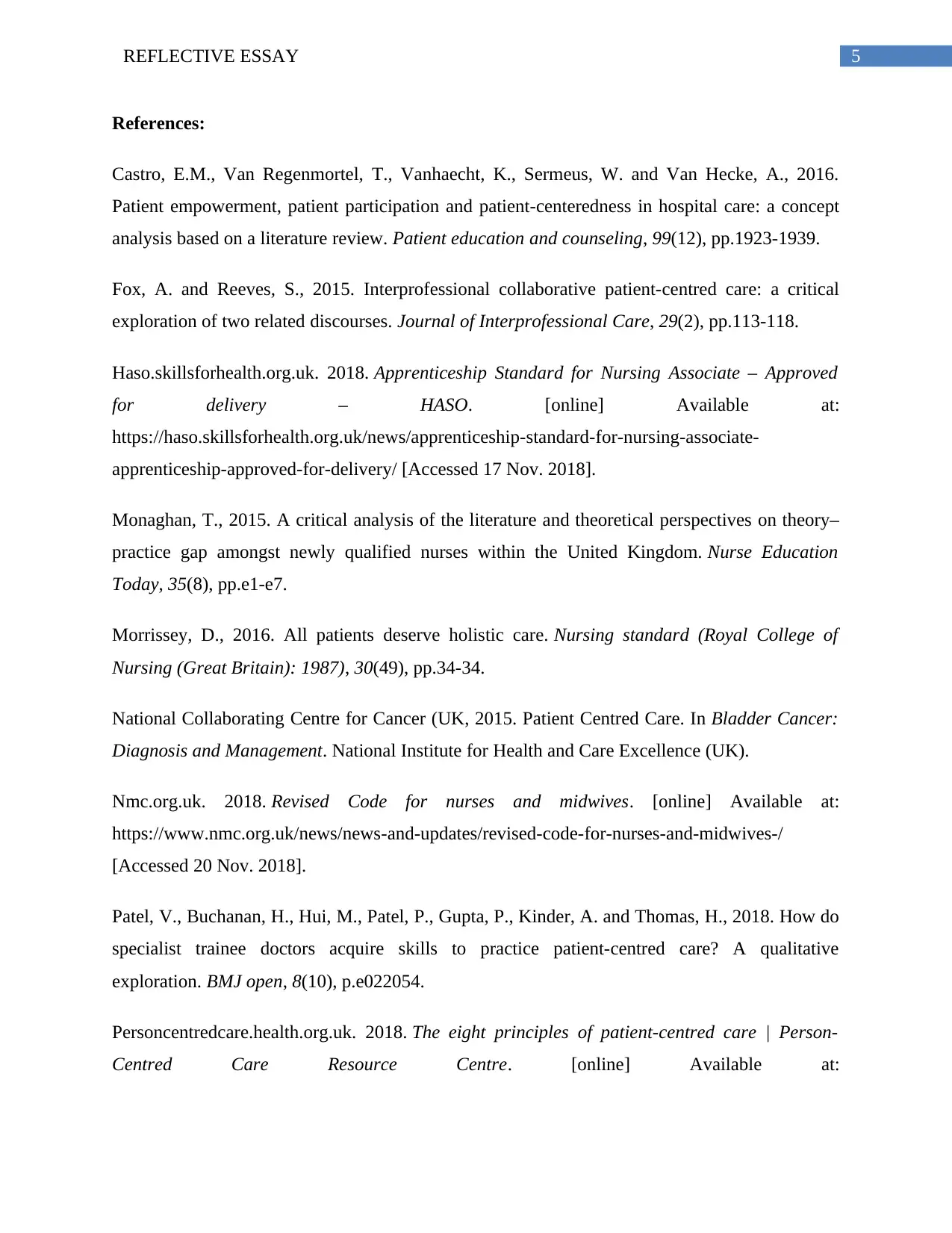
5REFLECTIVE ESSAY
References:
Castro, E.M., Van Regenmortel, T., Vanhaecht, K., Sermeus, W. and Van Hecke, A., 2016.
Patient empowerment, patient participation and patient-centeredness in hospital care: a concept
analysis based on a literature review. Patient education and counseling, 99(12), pp.1923-1939.
Fox, A. and Reeves, S., 2015. Interprofessional collaborative patient-centred care: a critical
exploration of two related discourses. Journal of Interprofessional Care, 29(2), pp.113-118.
Haso.skillsforhealth.org.uk. 2018. Apprenticeship Standard for Nursing Associate – Approved
for delivery – HASO. [online] Available at:
https://haso.skillsforhealth.org.uk/news/apprenticeship-standard-for-nursing-associate-
apprenticeship-approved-for-delivery/ [Accessed 17 Nov. 2018].
Monaghan, T., 2015. A critical analysis of the literature and theoretical perspectives on theory–
practice gap amongst newly qualified nurses within the United Kingdom. Nurse Education
Today, 35(8), pp.e1-e7.
Morrissey, D., 2016. All patients deserve holistic care. Nursing standard (Royal College of
Nursing (Great Britain): 1987), 30(49), pp.34-34.
National Collaborating Centre for Cancer (UK, 2015. Patient Centred Care. In Bladder Cancer:
Diagnosis and Management. National Institute for Health and Care Excellence (UK).
Nmc.org.uk. 2018. Revised Code for nurses and midwives. [online] Available at:
https://www.nmc.org.uk/news/news-and-updates/revised-code-for-nurses-and-midwives-/
[Accessed 20 Nov. 2018].
Patel, V., Buchanan, H., Hui, M., Patel, P., Gupta, P., Kinder, A. and Thomas, H., 2018. How do
specialist trainee doctors acquire skills to practice patient-centred care? A qualitative
exploration. BMJ open, 8(10), p.e022054.
Personcentredcare.health.org.uk. 2018. The eight principles of patient-centred care | Person-
Centred Care Resource Centre. [online] Available at:
References:
Castro, E.M., Van Regenmortel, T., Vanhaecht, K., Sermeus, W. and Van Hecke, A., 2016.
Patient empowerment, patient participation and patient-centeredness in hospital care: a concept
analysis based on a literature review. Patient education and counseling, 99(12), pp.1923-1939.
Fox, A. and Reeves, S., 2015. Interprofessional collaborative patient-centred care: a critical
exploration of two related discourses. Journal of Interprofessional Care, 29(2), pp.113-118.
Haso.skillsforhealth.org.uk. 2018. Apprenticeship Standard for Nursing Associate – Approved
for delivery – HASO. [online] Available at:
https://haso.skillsforhealth.org.uk/news/apprenticeship-standard-for-nursing-associate-
apprenticeship-approved-for-delivery/ [Accessed 17 Nov. 2018].
Monaghan, T., 2015. A critical analysis of the literature and theoretical perspectives on theory–
practice gap amongst newly qualified nurses within the United Kingdom. Nurse Education
Today, 35(8), pp.e1-e7.
Morrissey, D., 2016. All patients deserve holistic care. Nursing standard (Royal College of
Nursing (Great Britain): 1987), 30(49), pp.34-34.
National Collaborating Centre for Cancer (UK, 2015. Patient Centred Care. In Bladder Cancer:
Diagnosis and Management. National Institute for Health and Care Excellence (UK).
Nmc.org.uk. 2018. Revised Code for nurses and midwives. [online] Available at:
https://www.nmc.org.uk/news/news-and-updates/revised-code-for-nurses-and-midwives-/
[Accessed 20 Nov. 2018].
Patel, V., Buchanan, H., Hui, M., Patel, P., Gupta, P., Kinder, A. and Thomas, H., 2018. How do
specialist trainee doctors acquire skills to practice patient-centred care? A qualitative
exploration. BMJ open, 8(10), p.e022054.
Personcentredcare.health.org.uk. 2018. The eight principles of patient-centred care | Person-
Centred Care Resource Centre. [online] Available at:
⊘ This is a preview!⊘
Do you want full access?
Subscribe today to unlock all pages.

Trusted by 1+ million students worldwide
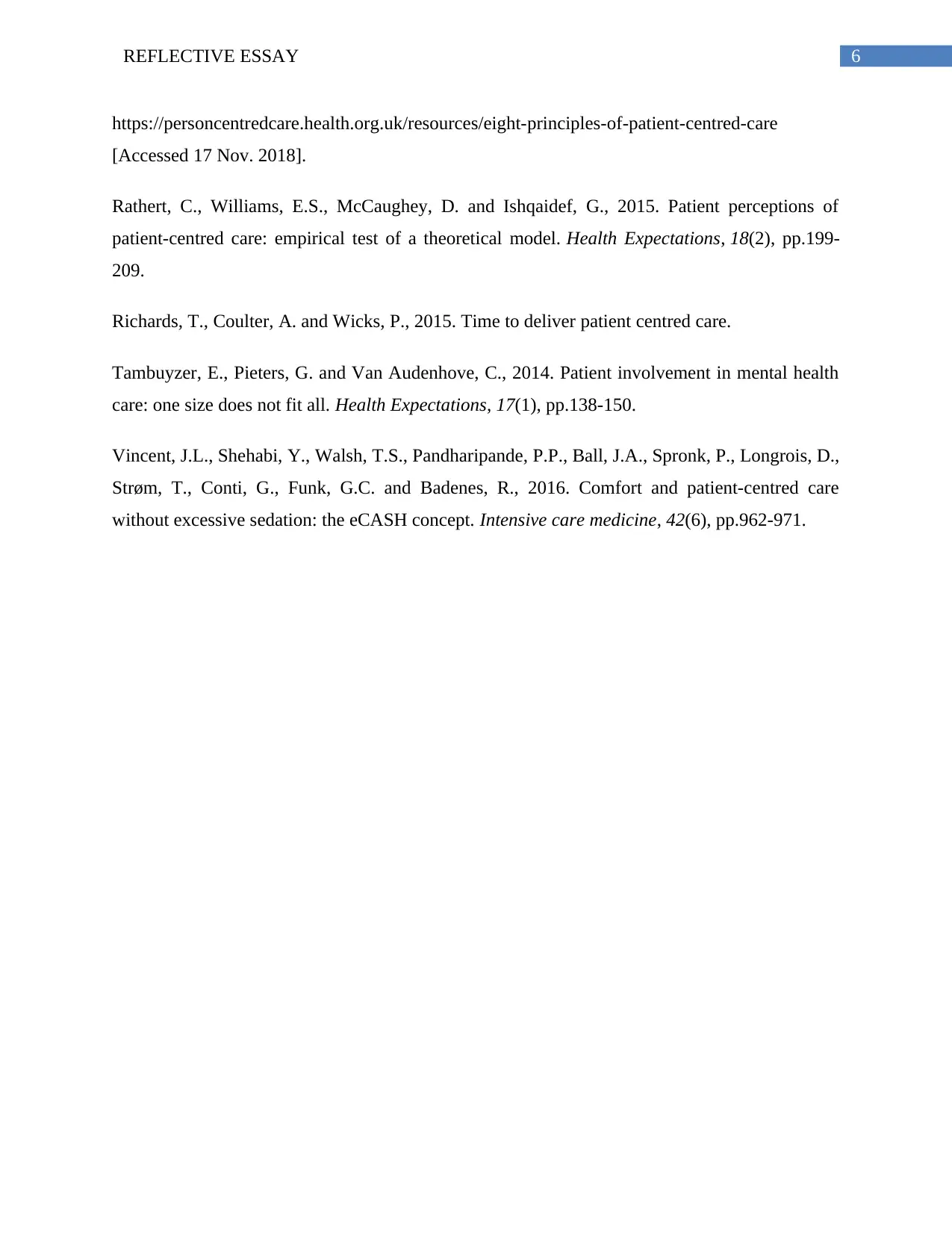
6REFLECTIVE ESSAY
https://personcentredcare.health.org.uk/resources/eight-principles-of-patient-centred-care
[Accessed 17 Nov. 2018].
Rathert, C., Williams, E.S., McCaughey, D. and Ishqaidef, G., 2015. Patient perceptions of
patient‐centred care: empirical test of a theoretical model. Health Expectations, 18(2), pp.199-
209.
Richards, T., Coulter, A. and Wicks, P., 2015. Time to deliver patient centred care.
Tambuyzer, E., Pieters, G. and Van Audenhove, C., 2014. Patient involvement in mental health
care: one size does not fit all. Health Expectations, 17(1), pp.138-150.
Vincent, J.L., Shehabi, Y., Walsh, T.S., Pandharipande, P.P., Ball, J.A., Spronk, P., Longrois, D.,
Strøm, T., Conti, G., Funk, G.C. and Badenes, R., 2016. Comfort and patient-centred care
without excessive sedation: the eCASH concept. Intensive care medicine, 42(6), pp.962-971.
https://personcentredcare.health.org.uk/resources/eight-principles-of-patient-centred-care
[Accessed 17 Nov. 2018].
Rathert, C., Williams, E.S., McCaughey, D. and Ishqaidef, G., 2015. Patient perceptions of
patient‐centred care: empirical test of a theoretical model. Health Expectations, 18(2), pp.199-
209.
Richards, T., Coulter, A. and Wicks, P., 2015. Time to deliver patient centred care.
Tambuyzer, E., Pieters, G. and Van Audenhove, C., 2014. Patient involvement in mental health
care: one size does not fit all. Health Expectations, 17(1), pp.138-150.
Vincent, J.L., Shehabi, Y., Walsh, T.S., Pandharipande, P.P., Ball, J.A., Spronk, P., Longrois, D.,
Strøm, T., Conti, G., Funk, G.C. and Badenes, R., 2016. Comfort and patient-centred care
without excessive sedation: the eCASH concept. Intensive care medicine, 42(6), pp.962-971.
1 out of 7
Related Documents
Your All-in-One AI-Powered Toolkit for Academic Success.
+13062052269
info@desklib.com
Available 24*7 on WhatsApp / Email
![[object Object]](/_next/static/media/star-bottom.7253800d.svg)
Unlock your academic potential
Copyright © 2020–2026 A2Z Services. All Rights Reserved. Developed and managed by ZUCOL.


